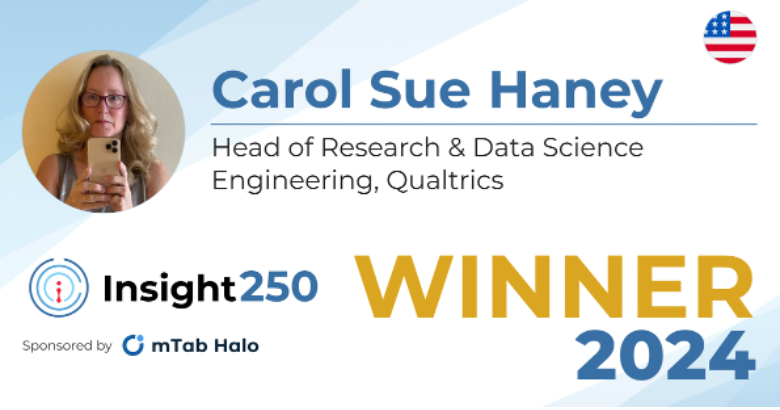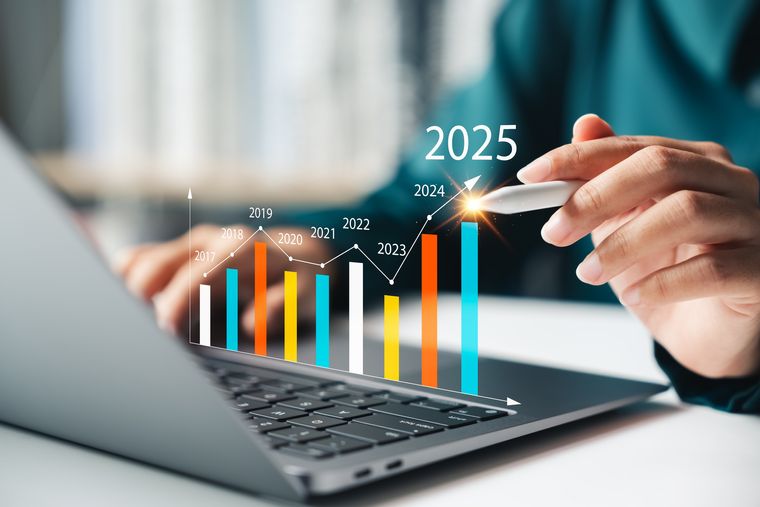How AI is Transforming Insights
With technology advancing at an incredible pace and the value of insights ever increasing, Crispin sat down with Insight250 Winner Carol Sue Haney, Head of Research & Data Science Engineering at Qualtrics.

Article series
Insight250
- The importance of business sense in research
- The role of humour in effective leadership
- The importance of ethics
- The importance of disruption in innovation and leadership
- The importance of Disruption in Innovation and Leadership Part 2
- The importance of Diversity & Inclusion
- The impact of colour
- Communicating insight with impact
- Insights on leadership, culture and polling
- The evolution of electric vehicles
- 2022 Top tips (part 1)
- 2022 Top tips (part 2)
- Maximising the potential of data
- The importance of flexible working
- Winners
- The importance of advanced analytics
- Judges for the 2022 Insight250 Awards announced
- The evolution from social listening to digital intelligence
- The Judges' Perspective
- The judge's perspective - part 2
- Insight Climate Collective
- Insights technology
- Understanding employee ownership
- Global insight perspectives
- Top Tips from our Leaders and Innovators
- The Evolution of Insights in the Food & Beverage Market
- The Evolution of Insights in CPG
- Neural Mechanisms Behind Consumer Decision-Making
- Celebrating and Elevating the Insights Industry
- The State of the Insights Industry
- Opportunities, challenges and threats that AI presents
- 2024 Insight250 Winners Announcement
- Connecting Brands and Consumers Through Insights
- The Importance of Human Insight and Attention
- The Elevating Role of Insights with Technology Innovation
- Haleon’s Insight Expert on Consumer Healthcare
- Insight from the Insight250: How AI is Impacting Qualitative Research
- How AI Tech is Doing the ‘Heavy Lifting’ for Insights
- Reviewing the top tips for 2025
- Google's Sarah Ashley on AI and revolutionising insights - Insights from the Insight250
- Beyond BI: The Future of Decision Intelligence for Insight Professionals
- The Advancement & Impact of Insights - An Insight250 Winners Series perspective with David Smith
- International Jury for the 2025 Insight250 Awards Announced
- Newly elected President, Anne-Sophie, on Revolutionizing the Impact of Insights
- Haleon's Litthya Baez on Enhancing Healthcare with Insights - Insight250 Winners Series
- Understanding the Insights of Consumer Decisions
- Moving Beyond Dashboards to Deliver Decisions with AI
- How AI is Transforming Insights
- How AI is Transforming Insights
- Five Years of Insight250: Elevating the Insight Industry
The Insight250 spotlights and celebrates 250 of the world’s premier leaders and innovators in market research, consumer insights, and data-driven marketing. The awards have created renewed excitement across the industry whilst strengthening the connectivity of the market research community. Winners of the 2024 Insight250 were announced last September - you can see the full list of Winners at Insight250.com. The 2025 award winners are in the process of being selected now.
With so many exceptional professionals named to the Insight250, we regularly tap into their expertise and unique perspectives across various topics. This regular series does just that: inquiring about the expert perspectives of many of these individuals in a series of short topical features.
With technology advancing at an incredible pace and the value of insights ever increasing, I sat down with Insight250 Winner Carol Sue Haney, Head of Research & Data Science Engineering at Qualtrics. At Qualtrics, Carol is a leader in quantitative data analysis, focusing on machine learning and AI. She works with clients in the tech, financial, retail, and telecom spaces, helping scope client needs to inform future engineering enhancements.
Crispin: Aside from being an Insight250 honoree last year, you also won the MRC Research Innovator Award - tell us more about this recognition?
CSH: First, I’m humbled and grateful to ESOMAR, mTab and the MRC for these recognitions. They mean a great deal because these organizations champion independent, ethical market research - work that gives people a voice and lets diverse opinions shape better decisions.
I believe market research is vital to healthy societies because it captures attitudes, experiences, and sentiments that drive positive change. At Qualtrics, our core mission is to improve the human experience through better understanding. Today, understanding customer experience is a growth driver: organizations that get this right gain and maintain a significant competitive edge.
The introduction of AI into customer experience research is truly revolutionary. Advances such as synthetic personas, agentic AI, omnichannel feedback, and the growing use of unstructured data are transforming how we generate insights. Working at the forefront of ML and genAI to elevate customer experiences is the most exciting period of my career, and I’m eager to see what the next ten years will bring.
Crispin: Carol, you’ve worked in leading global brands from Taylor Nelson Sofres and Harris Interactive to Toluna and, for the last decade, Qualtrics, do views around the importance of insights differ between companies and geographically?
CSH: Yes and no. Across a subset of agencies, I’ve worked with people who consistently work hard to deliver excellent insights, whether through core analytics or new approaches. Every market research agency develops its own culture and methods, and that shapes how insights are valued and produced.
I also saw how industry consolidation in the early 2000s changed things. After acquisitions and mergers, there was often a “land grab” as different teams and functions merged, and each company brought its own ways of doing the same analytics. That meant familiar staples like crosstabs and topline reports continued, but companies also promoted their unique innovations to drive critical insights — so views and practices vary, but the aim of delivering useful insights remains constant.
Crispin: With the rise of AI and synthetic data is using insights to drive commercial decisions, increasing or decreasing; why do you think that is happening, and what are the pitfalls to avoid?
CSH: We’re living in an always‑on, multi-channel economy where change happens fast, customer needs are diverse, and there is constant pressure to do more with less. Leaders need accurate insights and predictions to run their businesses — even an imperfect signal that delivers substantially more information is better than none.
AI and synthetic data are central to this shift. Generative AI has changed how we search and summarize verbatim responses. Tasks that used to take weeks, like coding open‑ends to produce quantitative insights, can now be done in seconds with comparable quality to human coders. Synthetic data also unlocks insights that would otherwise be near impossible to obtain: reaching hard‑to‑access geographies, finding rare target audiences, or avoiding the sometimes prohibitive cost of custom research.
When companies use customer experience insights to drive commercial decisions, they typically gain market share. The most successful organizations are quantitatively driven in their decision‑making, and we’re seeing more firms incorporate customer experience insights into strategic choices.
There are important pitfalls to avoid. First, data security and privacy must be central: if systems aren’t secure and compliant, all other advances become meaningless. Second, avoid overreliance on synthetic outputs without validation; treat synthetic data and AI scores like statistical estimates and validate them, understanding their limitations. Third, be watchful for bias and representativeness issues: synthetic data and models can amplify biases if the underlying data or assumptions are flawed, so monitor for skew and test generalizability. Finally, maintain transparency and explainability so stakeholders understand how insights are produced and the uncertainty around them, enabling informed decisions.
Crispin: What do you see as the key challenges facing insights professionals in 2025?
CSH: There are three key challenges insights professionals will face in 2025: updating research skills for new data sources, maintaining trust in augmented and synthesized insights, and choosing appropriate statistical approaches that drive business action.
First, omnichannel data and generative AI are reshaping how we collect and analyze information, so traditional methodologies and playbooks need a thorough refresh. Researchers must continually learn and adapt to new tools, data types, and workflows to remain effective.
Second, trust is harder to earn in a world of augmentation and synthesis. With AI-generated summaries, synthetic data, and automated scoring becoming routine, teams must validate outputs, surface uncertainty, and be transparent about methods to preserve credibility with stakeholders.
Third, the proliferation of insight types creates a prioritization and quality problem: researchers must distinguish which signals matter most and apply the right statistics to ensure decisions are sound. Given the many options, working with proven research partners and governance frameworks helps ensure methods match business objectives and that results are reliable and actionable.
Crispin: Do you believe there is an opportunity for market research teams to deliver greater impact with new technology, and if so, how?
CSH: There’s a revolution underway in market research as noted above, and I see five key evolutions taking place.
First, real-time, full-population understanding: we’re moving beyond sampling to listening to and understanding entire customer populations in real time. That lets teams pinpoint pain points even in small, niche segments and optimize experiences immediately — a major step forward from traditional surveys, which still remain valuable.
Second, omnichannel data is becoming central. Insights now come from many sources — web, mobile, in-store interactions, social, support channels, product telemetry — and integrating those streams provides a far richer, more complete view of customer behavior and sentiment. We couldn’t do the real-time integration of omnichannel data even 5 years ago. Now, we see clients creating composite scores based on Google reviews and call center transcript data as part of an all-up measure to communicate performance.
Third, synthetic data is a powerful new capability. It augments human data collection to fill gaps where traditional research is difficult or impossible, such as regions without infrastructure, rare subpopulations, or situations where direct measurement is impractical. Synthetic data helps model scenarios and expand coverage without compromising privacy when generated and validated correctly. I’ve worked on studies even five years ago where we just couldn’t get data from specific geographies - today, we can understand the attitudes and preferences of those impossible-to-reach populations quantitatively.
Fourth, synthetic scoring is being used to infer experiences for people who don’t participate in
surveys. By combining behavioral signals, transaction data, and modeled profiles, organizations can estimate likely experiences and outcomes at scale, enabling more proactive interventions.
Fifth, extracting quantitative insights from unstructured data is a game-changer. Advances in AI let us code and analyze verbatim text, speech transcripts, and other unstructured sources with unprecedented speed and accuracy, removing much of the manual “grunt” work and turning qualitative input into actionable metrics.
Together, these techniques allow customer experience and insights teams to deliver greater impact by understanding and optimizing experiences for entire customer populations, including small segments, in ways that were previously impossible. Across industries — from travel and hospitality optimizing stays, to retail personalizing offers, to healthcare improving patient journeys, to finance detecting friction in onboarding — these capabilities are being applied to drive better outcomes, higher retention, and measurable commercial value.
Crispin: What should researchers prioritize to build trust in AI synthetic data?
CSH: Synthetic sampling is and will transform data collection, and it’s been incredible to see how quickly accuracy, precision, and recall have improved in just the last two years. I’m seeing synthetic sampling applied across customer experience, product testing, advertising, and more. The practical value is that teams can get near-real-time signals across entire populations, not just samples, and act on small but important segments that would otherwise be invisible.
One of the clearest ways to build confidence in synthetic research is to test it side-by-side with human-collected data. Run the same survey or study using both human respondents and a synthetically generated population, then compare outcomes across key metrics. That audit will show you where synthetic approaches match human results, where they diverge, and how to calibrate models. Over time, as synthetics consistently demonstrate comparable quality, teams will become comfortable using them to augment or substitute traditional collections in appropriate contexts.
Real-time synthetic scoring is another powerful advancement. By combining behavioral signals, transaction data, and modeled profiles, organizations can infer likely experiences or outcomes for people who don’t participate in surveys. This enables proactive interventions — for instance, identifying likely detractors before they churn or personalizing outreach to high-value customers based on predicted satisfaction. The key is that synthetic scoring turns fragmented signals into actionable predictions at scale, shortening the feedback loop between insight and action.
To build trust in AI and synthetic data, researchers should prioritize robust security, transparency, and validation. Security is non-negotiable: ensure vendors and platforms ring-fence generative models, host proprietary LLMs when required, and adopt strong data governance so that synthetic outputs cannot be traced back to individual real records.
Transparency about methods and assumptions is equally important — stakeholders need clear explanations of how synthetic samples were generated, what data informed them, and what limitations exist. Validation must be ongoing: routinely benchmark synthetic outputs against ground truth, surface uncertainty and confidence intervals, and document failure modes.
Ultimately, trust grows when teams understand how AI is being used to augment insights rather than replace judgment. Treat synthetic data and scores like statistical estimates — validate, monitor for bias, and combine with human expertise. With careful governance, security, and empirical testing, researchers can help clients become as comfortable with synthetic data as they are with traditional statistics today, unlocking faster, broader, and more inclusive insights.
Crispin: At Qualtrics, you run massive projects. What is your advice for running large-scale research programs?
CSH: My biggest piece of advice for running large-scale research programs today is to embrace technology to gain dramatic efficiencies. Today, much of the repetitive manual work in research can be automated without sacrificing quality. Verbatim coding and enrichment happen in seconds, delivering sentiment, emotion, actionability and topic-level insights that were hard or impossible to achieve by hand. We can ingest data across channels — operational and experiential — and close the loop with customers in real time. That capability not only speeds insight-to-action, it signals to customers that their experiences matter.
Advanced analytics and predictive techniques can be embedded directly in dashboards so decisions are informed as conditions change. For example, what once required hours of watching interview videos and writing summaries can now yield real-time transcripts, automated summaries, and tagged themes, enabling quantitative analysis of richer qualitative sources in a fraction of the time.
With generative AI and real-time synthetic scoring, we can listen to and understand entire customer populations, including niche segments at the tails, and identify systemic issues more quickly. This doesn’t replace humans — it augments them, taking on the heavy lifting so researchers can focus on interpretation, strategy, and acting on insights.
Finally, none of this works without rigorous data security and trust. Build governance, validate models, surface uncertainty, and ensure your vendors and platforms protect data. With technology, strong validation, and clear governance, large-scale programs can deliver faster, deeper, and more actionable insights than ever before.
TOP TIP
Crispin: What’s your top tip to be a leader and innovator in our profession?
CSH: For true leadership, it’s about making customer experience and research a priority and tying it directly to business outcomes. Don’t let insights be an ‘ugly stepchild’ in a company. Instead, invest in it, make it a priority, and tie your metrics directly to business outcomes. Quantitatively measure it and hold teams accountable to show that these advanced insights are driving a true advantage in the marketplace, increasing revenue, and creating efficiencies for bottom-line savings. When you can connect your work to tangible business value, you’re not just a researcher; you’re a strategic driver of the business.
Crispin: Thank you for sharing the unique perspective you have gained through your extensive experience. It’s been fantastic to hear your thoughts on the state and growth of the industry and where you see it evolving in terms of impact and innovation in the future.

Crispin Beale
Chairman at QuMind, CEO at Insight250, Senior Strategic Advisor at mTab, CEO at IDXCrispin Beale is a marketing, data and customer experience expert. Crispin spent over a decade on the Executive Management Board of Chime Communications as Group CEO of leading brands such as Opinion Leader, Brand Democracy, Facts International and Watermelon. Prior to this Crispin held senior marketing and insight roles at BT, Royal Mail Group and Dixons. Crispin originally qualified as a chartered accountant and moved into management consultancy with Coopers & Lybrand (PwC). Crispin has been a Board Director (and Chairman) of the MRS for nearly 20 years and UK ESOMAR Representative for c15 years. As well as being CEO of Insight250, Crispin is currently Worldwide CEO of Digital Communications Solution Agency, IDX. Crispin is also the Senior Strategic Advisor at mTab and the Chairman of QuMind and spent 4 years as Group President of Behaviorally where he was responsibile for the client & commercial teams globally. Crispin is a passionate advocate for blending human intelligence and technology to deliver innovation and leadership across organisations.
Article series
Insight250
- The importance of business sense in research
- The role of humour in effective leadership
- The importance of ethics
- The importance of disruption in innovation and leadership
- The importance of Disruption in Innovation and Leadership Part 2
- The importance of Diversity & Inclusion
- The impact of colour
- Communicating insight with impact
- Insights on leadership, culture and polling
- The evolution of electric vehicles
- 2022 Top tips (part 1)
- 2022 Top tips (part 2)
- Maximising the potential of data
- The importance of flexible working
- Winners
- The importance of advanced analytics
- Judges for the 2022 Insight250 Awards announced
- The evolution from social listening to digital intelligence
- The Judges' Perspective
- The judge's perspective - part 2
- Insight Climate Collective
- Insights technology
- Understanding employee ownership
- Global insight perspectives
- Top Tips from our Leaders and Innovators
- The Evolution of Insights in the Food & Beverage Market
- The Evolution of Insights in CPG
- Neural Mechanisms Behind Consumer Decision-Making
- Celebrating and Elevating the Insights Industry
- The State of the Insights Industry
- Opportunities, challenges and threats that AI presents
- 2024 Insight250 Winners Announcement
- Connecting Brands and Consumers Through Insights
- The Importance of Human Insight and Attention
- The Elevating Role of Insights with Technology Innovation
- Haleon’s Insight Expert on Consumer Healthcare
- Insight from the Insight250: How AI is Impacting Qualitative Research
- How AI Tech is Doing the ‘Heavy Lifting’ for Insights
- Reviewing the top tips for 2025
- Google's Sarah Ashley on AI and revolutionising insights - Insights from the Insight250
- Beyond BI: The Future of Decision Intelligence for Insight Professionals
- The Advancement & Impact of Insights - An Insight250 Winners Series perspective with David Smith
- International Jury for the 2025 Insight250 Awards Announced
- Newly elected President, Anne-Sophie, on Revolutionizing the Impact of Insights
- Haleon's Litthya Baez on Enhancing Healthcare with Insights - Insight250 Winners Series
- Understanding the Insights of Consumer Decisions
- Moving Beyond Dashboards to Deliver Decisions with AI
- How AI is Transforming Insights
- How AI is Transforming Insights
- Five Years of Insight250: Elevating the Insight Industry


